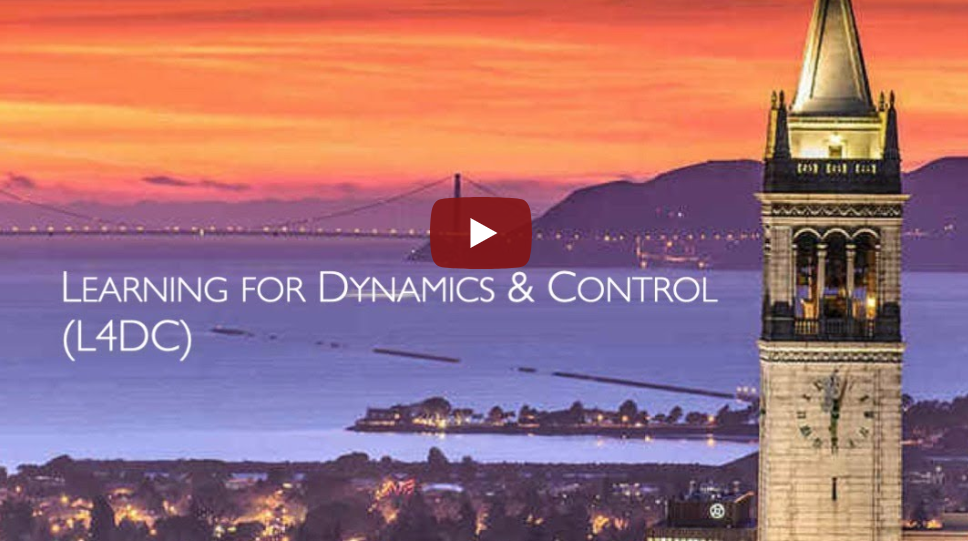
ΑΙhub.org
Learning for dynamics and control conference

The second conference on learning for dynamics and control (L4DC) was held on 11-12 June. In their introduction to the conference, the organisers write that “over the next decade, the biggest generator of data is expected to be devices which sense and control the physical world.” They note that this explosion of real-time data from the physical world requires a rapprochement of areas such as machine learning, control theory, and optimization. The overall goal for the conference is to create a new community of people that think rigorously across the disciplines, ask new questions, and develop the foundations of this new scientific area.
The live streams of the conference were made available to all and included invited talks and contributed talks. You can watch recordings of these streams from both days of the event. All of the accepted papers can be found here.
Thursday 11 June
Here is the agenda for day one, with the times corresponding to the relevant position in the video recording above:
INVITED TALK
06:20 Karen Willcox – Predictive digital twins: Where data-driven learning meets physics-based modeling.
Dynamics Learning II (4 talks)
47:33 Learning to correspond dynamical systems – Nam Hee Kim, Zhaoming Xie and Michiel van de Panne
1:03:55 Learning dynamical systems with side information – Amir Ali Ahmadi and Bachir El Khadir
1:20:21 Learning nonlinear dynamical systems from a single trajectory – Dylan Foster, Tuhin Sarkar and Alexander Rakhlin
1:34:45 Universal simulation of dynamical systems by recurrent neural nets – Joshua Hanson and Maxim Raginsky
Policy Learning II (3 talks)
2:01:57 Data-driven distributionally robust LQR with multiplicative noise – Peter Coppens, Mathijs Schuurmans and Panagiotis Patrinos
2:16:36 Learning the model-free linear quadratic regulator via random search – Hesameddin Mohammadi, Mihailo R. Jovanović and Mahdi Soltanolkotabi
2:32:17 Optimistic robust linear quadratic dual control – Jack Umenberger and Thomas B Schon
INVITED TALK
3:00:30 Catherine Wolfram – Measuring the socioeconomic returns to high quality electricity
Friday 12 June
Here is the agenda for day two, with the times corresponding to the relevant slot in the video recording:
INVITED TALK
07:30 Leslie Kaelbling – Doing for our robots what nature did for us
INVITED TALK
38:40 John Lygeros – Data enabled predictive control: Stochastic systems and implicit dynamic predictors
Policy Learning I (4 talks)
1:20:15 Policy optimization for H2 linear control with Hinfinity robustness guarantee: Implicit regularization and global convergence – Kaiqing Zhang, Bin Hu and Tamer Basar
1:35:55 Scalable reinforcement learning of localized policies for multi-agent networked systems – Guannan Qu, Adam Wierman and Na Li
1:50:55 Learning convex optimization control policies – Akshay Agrawal, Shane Barratt, Stephen Boyd and Bartolomeo Stellato
2:06:25 Online data poisoning attacks – Xuezhou Zhang, Xiaojin Zhu and Laurent Lessard
Dynamics Learning I (3 talks)
2:34:32 Finite sample system identification: Optimal rates and the role of regularization – Yue Sun, Samet Oymak and Maryam Fazel
2:48:22 Sample complexity of Kalman filtering for unknown systems – Anastasios Tsiamis, Nikolai Matni and George Pappas
3:04:30 A spatially and temporally attentive joint trajectory prediction framework for modeling vessel intent – Jasmine Sekhon and Cody Fleming
INVITED TALK
Chelsea Finn – Extrapolation via adaptation
Organising an event like this is no mean feat and one of the organisers (Ben Recht) has given his personal take in this blog post, where he reflects on the pros and cons of a virtual event, and proposes possible suggestions for the future of conferences and publishing.










